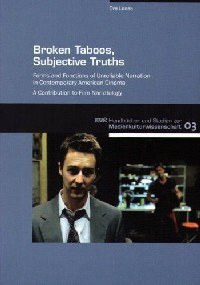Fictive Worlds and ‘Real’ Worlds: The Staging and Reception of Unreliable Narration in Hollywood Cinema
DOI:
https://doi.org/10.22029/ko.2010.517Abstract
Eva Laass' English-language dissertation investigates the staging and reception of 'unreliable narration' in film, using examples of popular Hollywood productions from the last two decades. The study was published as the third volume in the series WVT-Handbücher und Studien zur Medienkulturwissenschaft (WVT-Handbooks and Studies in Media Culture), edited by Knut Hickethier and Ansgar Nünning. Based on theoretical concepts of cognitive and intermedial narratology, the author develops a typology to describe and categorise unreliable filmic narration, which is applied and tested in close readings of films such as Forrest Gump (1994), Fight Club (1999), The Usual Suspects (1995), and Memento (2000). Consistently considering the viewer’s role as an active participant turns out to be a productive strategy in the course of her argument. The study closes with an investigation of the social dimension of unreliable narration which locates it within the specific sociopolitical context of Hollywood cinema.

Downloads
Published
Issue
Section
License
All articles (not book covers) in KULT_online from issue 50 on are published under the license Creative Commons Attribution 4.0. All published articles may be reused under the conditions of the license, particularly for commercial purposes and through editing the article (Human-Readable Summary). All authors (have) permitted the publication under the above mentioned license. There is no copyright transfer towards KULT_online. For all book covers specific rights might be reserved, please contact the respective publisher for any lawful reuse. All contributions published in issue 1-49 of KULT_online are free available online and protected by the German Copyright Law.



